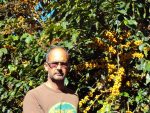85.41
The Sitio Araucária’s origin is on “Sesmaria das Três Barras” (*Sesmaria is a land given by the Portugal Crown to some Brazilian and Portuguese families), granted by the Portuguese Crown to Manoel Ramos da Silva in the end of the 18th century, although one glebe of lands was later acquired by Custódio Ribeiro Pereira Guimarães, ancestor of the current owners, in 1811. Over the generations this glebe suffered natural subdivisions, until in 1993 there was a propriety transfer among the successors of the “Old” Custódio. Kleber de Castro Junqueira acquired then from Pedro Henrique Junqueira, his dad’s cousin, the lands that today make the Sitio Araucária.
Kleber de Castro Junqueira is part of a familiar group of producers with his parents José Wagner Ribeiro Junqueira and Margarida Maria de Castro Junqueira, and the brothers Ralph and Herbert de Castro Junqueira. The planted areas with coffee – from several varieties on the six proprieties belonging to the group – occupy around 160 hectares. The processing and elaboration of all coffee produced by the family are centralized on the headquarters, the renowned Fazenda Serra das Três Barras, which benefits, on average, 3.500 bags a year. The Junqueira’s coffee plantations are cultivated on fertile lands, from a characteristic Serra da Mantiqueira relief, where the altitude varies from 1.100 to 1.450 meters. On those regions, the seasons are well defined, the temperature is mild during the whole year and the rainfall index varies between 1.700 and 2.200 mm annually. The family develops the coffee growing, their main rural activity from eight generations, in constant harmony with nature, preserving hard the areas with native forest and the many sources existent on the proprieties. The family also counts on the collaboration of nine direct employees and their families and with the services of other thirty employees during the harvest, when the demand for work is higher.
Coffee processing system:
Due to the slope of the land where they are cultivated, the coffee is put on the adequate time on the cloths, to avoid them getting in direct contact with the land. The picked grains are immediately transported to the processing place. Once peeled, the coffee “cherry” is taken to the drying yards and, if necessary, to the rotary dryer, heading to the deposit in adequate granaries for rest during a period of 60 to 90 days. After being benefited, the coffee is taken to COCARIVE warehouses, where the lots are analyzed and prepared according to the market’s demands.
Quality concern:
In view of quality of the coffee produced, without, however, letting go of the productivity, the group counts with the highly technical assistance and widespread by COCARIVE, in important partnership with EMATER-MG.
| Rank | 16 |
|---|---|
| Farm Name | Sitio Araucária |
| Farmer/Rep. | Kleber de Castro Junqueira |
| Altitude | 1400 masl |
| Country | Brazil Pulped Naturals |
| Year | 2011 |
| Size (30kg boxes) | 42 |
| City | Carmo de Minas |
| Region | MG |
| Program | Brazil Pulped Naturals 2011 |
| Month | - |
| Aroma/Flavor | apple, caramel, tropical fruits, papaya, peach, mango, floral |
| Acidity | malic, apple, tartaric |
| Other | elegant, clean, milky, round mouthfeel, sweet malty |
| Processing system | Pulped Natural organic |
| Variety | Yellow Bourbón |
| Coffee Growing Area | 20 hectares |
| Farm Size | 37.5 hectares |
| Auction Lot Size (lbs.) | 2777.8 |
| High bid | 5.20 |
| Total value | 14444.54 |
| High bidders | Kaffebrenneriet as |




